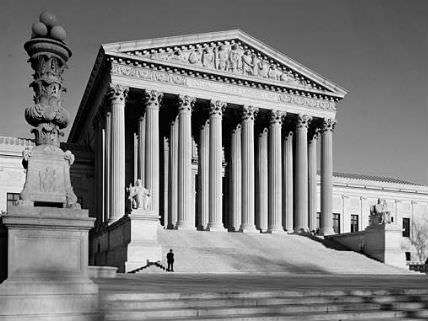Citing Judicial Deference, Conservative Federal Judge Upholds Maryland 'Assault Weapons' Ban
Judge J. Harvie Wilkinson urges judicial minimalism in Second Amendment case.

Last week the U.S. Court of Appeals for the 4th Circuit upheld a Maryland gun control law that bans "assault weapons" and detachable large-capacity magazines, holding that the Second Amendment offers no impediment to such legislation.
Among the judges who joined the 4th Circuit's 10-4 decision in this case, Kolbe v. Hogan, was a highly respected legal conservative named Judge J. Harvie Wilkinson III.
What led a respected conservative judge to uphold a sweeping gun control law? In addition to joining the majority opinion, Wilkinson filed a separate concurrence in which he explained his thinking. According to Wilkinson, the matter boiled down to the core principle of judicial deference. "It is altogether fair," Wilkinson wrote, "to argue that the assault weapons here should be less regulated, but that is for the people of Maryland (and the Virginias and the Carolinas) to decide."
In Wilkinson's view, if the federal courts enter the business of invalidating democratically enacted gun control measures such as the ones at issue here, the end result will be to "empower the judiciary and leave Congress, the Executive, state legislatures, and everyone else on the sidelines." As far as Wilkinson is concerned, the federal courts "are not impaneled to add indefinitely to the growing list of subjects on which the states of our Union and the citizens of our country no longer have any meaningful say."
Wilkinson's concurrence offers the classic argument for judicial deference, or judicial restraint: If you don't like what your lawmakers have done, take your complaint to the ballot box, not to the courthouse. For decades this was a dominant view among legal conservatives. Indeed, as recently as twenty years ago, Wilkinson's ode to judicial minimalism would have placed him squarely within the mainstream of conservative legal thought, even though it arose in the context of a Second Amendment case.
But the times are changing. Judicial deference is no longer quite as popular among legal conservatives as it once was, and this particular case helps to illustrate why. After all, doesn't the Second Amendment itself suggest that there are some subjects on which democratic majorities should not have any meaningful say? Doesn't the Constitution place certain rights beyond the reach of lawmakers, and isn't it sometimes the job of the federal courts to enforce those constitutional limits and strike down overreaching legislation, even when such judicial action requires the courts to act in an anti-democratic fashion?
As a principled advocate of judicial deference, Wilkinson effectively answers no to such queries. The big question going forward is how many legal conservatives are still willing to side with Wilkinson.
Related: Conservatives v. Libertarians: The debate over judicial activism divides former allies.



Show Comments (64)